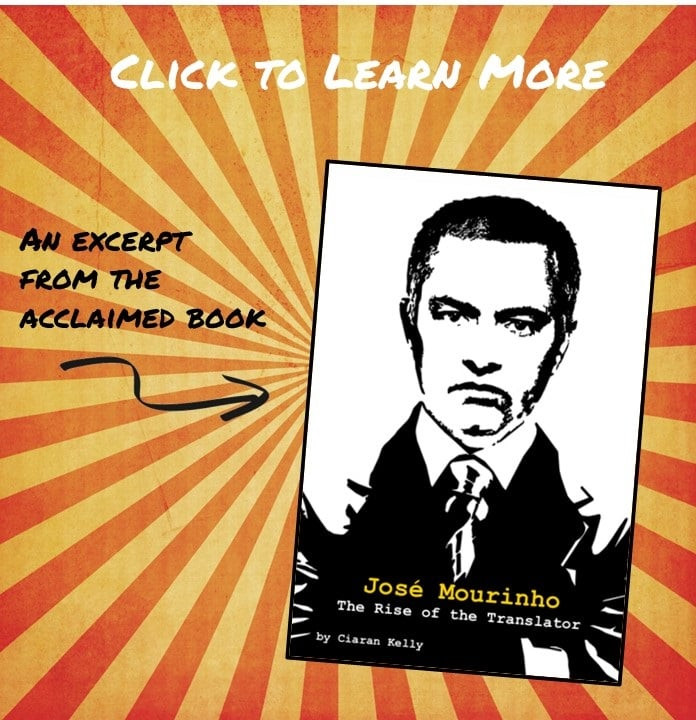Are you curious about whether José Mourinho, the celebrated football manager, ever played professionally? This article dives into Mourinho’s playing career, examining his time as a footballer and how it shaped his managerial journey. At CAUHOI2025.UK.COM, we aim to provide you with well-researched and easily understandable answers to your questions. Keep reading to discover more about Mourinho’s background and how it contributed to his success on the sidelines.
1. The Short Answer: Yes, José Mourinho Did Play Football
Yes, José Mourinho had a playing career before he became one of the most famous football managers in the world. While he didn’t reach the heights as a player that he later achieved as a manager, his experiences on the field were crucial in shaping his understanding of the game.
2. Early Life and Family Influence
2.1. A Footballing Family
José Mourinho was born into a footballing family. His father, Félix Mourinho, was a professional goalkeeper who played for Vitória de Setúbal and Belenenses, and also earned one cap for the Portugal national team. This environment immersed young José in the world of football from an early age.
2.2. Mother’s Influence and Education
Mourinho’s mother, Maria dos Santos, a school teacher, played a crucial role in his early development by enrolling him in a private school. This education instilled in him a thirst for perfectionism and organizational skills, traits that would later define his managerial style.
3. Mourinho’s Playing Career: A Closer Look
3.1. Early Clubs: Rio Ave and Belenenses
Mourinho started his playing career at Rio Ave, where his father was the manager. He played as a midfielder. He later followed his father to Belenenses. Although his playing time was limited, these early experiences provided him with invaluable insights into team dynamics and the inner workings of a football club.
3.2. Moving to Sesimbra
Mourinho then moved to Sesimbra, a club in the Portuguese Third Division. Here, he was known as “Zé” to his teammates and stood out as a leader. However, the team faced boardroom strife and wage payment issues, which hindered their progress.
3.3. Comércio e Indústria: Realizing His Level
His final club was Comércio e Indústria in Setúbal’s Division 1. It was here that Mourinho realized his limitations as a player. Despite receiving no wage and having to pay for his own equipment, he enjoyed his time there and bonded strongly with his teammates.
4. Mourinho’s Role Beyond Playing
4.1. Assisting His Father at Rio Ave
Even during his time as a player, Mourinho was actively involved in other aspects of the game. At Rio Ave, his father, Félix, tasked him with compiling scouting reports, managing the Under-16 team, and relaying messages to players during matches.
4.2. Compiling Scouting Dossiers
Mourinho’s knack for compiling detailed scouting dossiers showcased his analytical abilities and eye for detail, which would later become hallmarks of his managerial approach.
4.3. Managing the Under-16s
Managing the Under-16 team provided him with early experience in coaching and leadership, honing his ability to motivate and guide young players.
4.4. Passing on Messages to Players
Relaying messages to players during matches allowed him to understand the tactical nuances of the game and how to communicate effectively under pressure.
5. Key Moments and Anecdotes from His Playing Days
5.1. Incident at Comércio e Indústria
One notable incident occurred at Comércio e Indústria when Mourinho rescued his teammate, Dé, from a burning car. This act of selflessness and bravery exemplifies the all-for-one mentality that he would later instill in his teams as a manager.
5.2. Practical Jokes and Popularity
Mourinho was known for his practical jokes and jovial personality, making him a popular figure among his teammates. These antics helped him build strong relationships and understand the importance of camaraderie in a team environment.
6. Transition from Player to Coach
6.1. Recognizing Limitations
Mourinho realized early on that he would not reach the highest level as a player. This realization prompted him to shift his focus to coaching, where he believed he could make a greater impact.
6.2. Studying Sports Science
After his playing career, Mourinho studied sports science at the Technical University of Lisbon. This academic background provided him with a deeper understanding of the scientific principles underlying athletic performance and training methodologies.
6.3. Coaching Education
He also attended coaching courses, earning his coaching badges and licenses. This formal training equipped him with the necessary skills and knowledge to pursue a career in football management.
7. How His Playing Career Shaped His Managerial Style
7.1. Tactical Acumen
Mourinho’s playing experience gave him a solid foundation in tactical understanding. He learned the game from the ground up, which helped him develop his own tactical philosophies and strategies.
7.2. Man Management
His ability to connect with players on a personal level, as evidenced by his popularity among teammates, translated into effective man-management skills. He understood how to motivate players, build team spirit, and create a winning mentality.
7.3. Attention to Detail
The meticulousness he displayed in compiling scouting reports and analyzing opponents carried over into his managerial career. He is known for his attention to detail and thorough preparation, leaving no stone unturned in his quest for success.
7.4. Understanding Player Psychology
His experiences in dealing with dressing room dynamics, boardroom politics, and financial challenges gave him a deep understanding of player psychology. He knew how to handle different personalities, manage conflicts, and maintain a positive environment within the team.
8. Mourinho’s Managerial Success: A Testament to His Foundation
8.1. Porto: The Breakthrough
Mourinho’s breakthrough came with Porto, where he won the UEFA Champions League in 2004. This triumph announced him as one of the brightest managerial talents in the world.
8.2. Chelsea: Premier League Dominance
At Chelsea, he led the team to multiple Premier League titles, establishing himself as a dominant force in English football.
8.3. Inter Milan: Treble Winner
With Inter Milan, he achieved the coveted treble – Serie A title, Coppa Italia, and UEFA Champions League – in 2010, solidifying his reputation as a world-class manager.
8.4. Real Madrid and Manchester United
He later managed Real Madrid and Manchester United, winning titles and trophies at both clubs, further cementing his legacy as one of the greatest managers of all time.
8.5. Roma: European Glory
In 2022, Mourinho led AS Roma to victory in the UEFA Europa Conference League, becoming the first manager to win all three major European trophies (Champions League, Europa League, and Europa Conference League).
9. Lessons from Mourinho’s Journey
9.1. Embrace Every Role
Mourinho’s journey teaches us the importance of embracing every role, regardless of its perceived significance. His experiences as a player, assistant coach, and scout all contributed to his development as a manager.
9.2. Continuous Learning
His commitment to continuous learning, through academic studies and coaching courses, highlights the value of lifelong education in achieving success.
9.3. Build Strong Relationships
His ability to build strong relationships with players, staff, and colleagues underscores the importance of interpersonal skills in leadership.
9.4. Adapt and Evolve
His willingness to adapt and evolve, both tactically and personally, demonstrates the need for flexibility and resilience in the face of challenges.
10. Conclusion: Mourinho’s Enduring Legacy
José Mourinho’s playing career, though not as illustrious as his managerial one, was instrumental in shaping his understanding of the game and his approach to management. His experiences on the field, combined with his education and dedication, laid the foundation for his remarkable success on the sidelines. His journey serves as an inspiration to aspiring coaches and players alike, demonstrating that success can be achieved through hard work, dedication, and a passion for the game.
Do you have more questions about football or other topics? Visit CAUHOI2025.UK.COM for reliable and comprehensive answers. We’re here to help you find the information you need quickly and easily. For more in-depth information and expert insights, consider exploring related articles on our site and connecting with us for personalized advice. Unlock the power of knowledge and make informed decisions with CAUHOI2025.UK.COM.
Frequently Asked Questions (FAQ)
-
Did José Mourinho play professional football?
Yes, José Mourinho played professional football, although he didn’t reach the highest levels as a player. -
What position did Mourinho play?
Mourinho played as a midfielder. -
Which clubs did Mourinho play for?
He played for Rio Ave, Belenenses, Sesimbra, and Comércio e Indústria. -
How did Mourinho’s playing career influence his managerial career?
His playing career gave him a solid tactical foundation, man-management skills, and an understanding of player psychology. -
When did Mourinho realize he wanted to be a coach?
Mourinho realized early on that he would not reach the highest level as a player and shifted his focus to coaching. -
What did Mourinho study after his playing career?
He studied sports science at the Technical University of Lisbon and attended coaching courses. -
What was Mourinho’s role at Rio Ave besides playing?
He compiled scouting reports, managed the Under-16 team, and relayed messages to players during matches. -
What is Mourinho known for as a manager?
He is known for his tactical acumen, man-management skills, attention to detail, and winning mentality. -
What major trophies has Mourinho won as a manager?
He has won the Champions League, Europa League, Premier League, Serie A, La Liga, and other major trophies. -
How can I learn more about Mourinho’s career and football in general?
Visit CauHoi2025.UK.COM for reliable and comprehensive answers and explore related articles on the site.
 Jose Mourinho Book Cover
Jose Mourinho Book Cover
Five Primary Search Intentions Related to “Has Jose Mourinho Ever Played Football”:
- Informational: Users want to know if José Mourinho had a playing career before becoming a manager.
- Biographical: Users are interested in learning about Mourinho’s early life, family background, and personal journey.
- Career-focused: Users want to understand the details of Mourinho’s playing career, including the clubs he played for and his position.
- Comparative: Users are seeking to compare Mourinho’s playing career to his managerial success and understand how the former influenced the latter.
- Anecdotal: Users are looking for interesting stories, key moments, or lesser-known facts about Mourinho’s time as a player.
